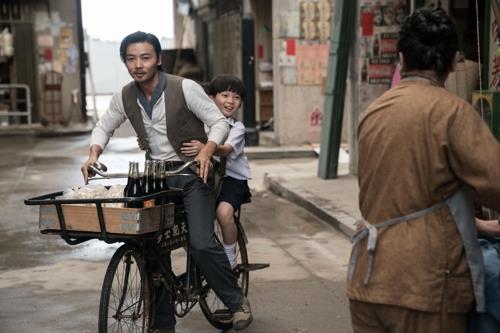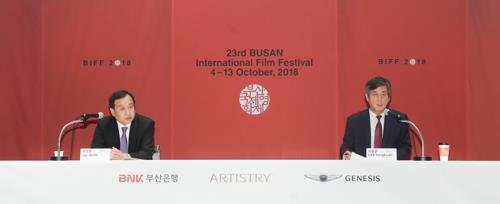- California Assembly OKs highest minimum wage in nation
- S. Korea unveils first graphic cigarette warnings
- US joins with South Korea, Japan in bid to deter North Korea
- LPGA golfer Chun In-gee finally back in action
- S. Korea won’t be top seed in final World Cup qualification round
- US men’s soccer misses 2nd straight Olympics
- US back on track in qualifying with 4-0 win over Guatemala
- High-intensity workout injuries spawn cottage industry
- CDC expands range of Zika mosquitoes into parts of Northeast
- Who knew? ‘The Walking Dead’ is helping families connect
Film about N. Korea defector to open Busan International Film Festival
SEOUL/BUSAN, Sept. 4 (Yonhap) — “Beautiful Days,” a South Korean drama about the agony of a female North Korean defector who settled in the South, will open the Busan International Film Festival (BIFF) next month, organizers said Tuesday.
Director Yun Jero’s film starring Lee Na-young follows the life of a defector who gives birth to a son at an early age and abandons her husband and child to defect to South Korea.
“Yun is a young director hailing from Busan with a tremendous talent — a reason that goes well with BIFF’s goal of cultivating new talents in South Korea and other Asian countries,” Jay Jeon, executive director of the festival, said of why the film was selected to open this year’s festival during a press conference in Seoul.
“We were also attracted by the film’s unique storyline on the restoration of a family relationship through two occasions of disintegration and by its being a social drama that depicts a timely story of North Korea defectors,” he added.

This photo provided by the Busan International Film Festival shows a scene from “Beautiful Days.” (Yonhap)
The festival will close with “Master Z: The Ip Man Legacy,” the latest from Hong Kong director Yuen Woo-Ping, an influential filmmaker best known for his work in action choreography.
The 23rd edition of the festival will take place from Oct. 4-13 at five cinemas, including the Busan Cinema Center, in Busan, 325 kilometers southeast of Seoul, and will feature 323 films from 79 countries. The numbers are up from last year’s 300 films and 76 participating nations. The festival will feature the world premieres of 115 films, including 85 feature and 30 short films.
Among the highlights of this year’s event is a new category called “Busan Classics,” in which movies with great significance in world film history will be screened. Thirteen films, including American director Orson Welles’ last film, “The Other Side of the Wind,” and a restored version of Milos Forman’s 1964 classic, “Black Peter,” will be shown in the section this year. The great Czech film director died in April.
In the Gala Presentation section for screening the latest works from contemporary master directors, three movies — “First Night Nerves” by Hong Kong director Stanley Kwan, “Killing” by Japanese director Shinya Tsukamoto and “Ode to the Goose” by Korean-Chinese director Zhang Lu — await movie fans.
Ten films from nine countries, including “Aurora” by Kyrgyzstani director Bekzat Pirmatov, “Clean Up” by South Korean director Kwon Man-ki and “Gold Carrier” by Iran’s Touraj Aslani, are up for competition in the “New Currents” section for up-and-coming Asian directors.

This photo provided by the Busan International Film Festival shows a scene from “Master Z: The Ip Man Legacy.” (Yonhap)
To commemorate the centennial anniversary of Filipino films, BIFF will put on an exhibition and special screenings of 10 classic films from the industry.
Kim Hong-joon, a professor of the Korea National University of Arts, will lead five jurors for the New Currents competition section.
This year’s festival will also present a retrospective screening of eight films by Lee Jang-ho, one of the most prominent South Korean filmmakers. The line-up includes his directorial debut, “Heavenly Homecoming To Stars” (1974), as well as films such as “Good Windy Days” (1980), “Children of Darkness” (1981), “Widow Dance” (1983) and “Declaration Of Fools (1983).”

Jay Jeon (L), executive director of the Busan International Film Festival, and Lee Yong-kwan, chairman of the festival’s board of directors, attend a press conference to announce the lineup for the 23rd edition of the festival in Seoul on Sept. 4, 2018. (Yonhap)
After years of political turmoil over “municipal interference,” the festival is expected to return to normality as three South Korean film industry groups led by the Directors Guild of Korea, which represents about 300 movie directors, have finally lifted their boycott.
BIFF has been in dispute with its top sponsoring city, Busan, since it screened a documentary about the Sewol ferry disaster despite opposition from the local government in October 2014. The Busan metropolitan government funds around half of the festival’s annual budget. Titled “The Truth Shall Not Sink With the Sewol” and also known as “Diving Bell,” the film criticized the former Park Geun-hye administration’s handling of the ferry sinking that claimed more than 300 lives, mostly teenage students, in April that year.
The Busan government subsequently conducted an unprecedented audit into then-executive director Lee Yong-kwan and other executive committee members and cut about half of its annual funding in what some filmmakers claimed was “political retaliation” for artistic expression. Lee left the position after he was given a suspended jail sentence for embezzlement of festival funds.
The measures led nine of the country’s top film bodies to boycott the festival for two years from 2015. Six of them lifted the boycott last year, but three maintained it until recently, demanding an apology from the Busan mayor for his role in the feud and the reinstatement of the ousted festival director.
They called off the boycott after Lee was appointed as the festival’s new chairman early this year and new Busan Mayor Oh Keo-don promised to ensure the festival’s artistic freedom on behalf of his predecessor last month.
Lee said this year should be “a turning point to prepare for a new leap” for the 22-year-old festival.
“I’m thrilled because I came to see you again after a few years,” he said during the press conference.
“It’s been seven months since I returned to the festival on Jan. 31 alongside Jay Jeon. We did all we can do to prepare for this year’s event despite time constraints. We don’t know how much we will be able to satisfy you but are pleased to come to present a good lineup as a result of hard work by our program staff. … I’d be appreciative if you see it as the first year of achieving harmony, normalization and a new leap,” Lee added.








![일본 사도광산 [서경덕 교수 제공. 재판매 및 DB 금지]](http://www.koreatimesus.com/wp-content/uploads/2024/07/PYH2024072610800050400_P4-copy-120x134.jpg)


